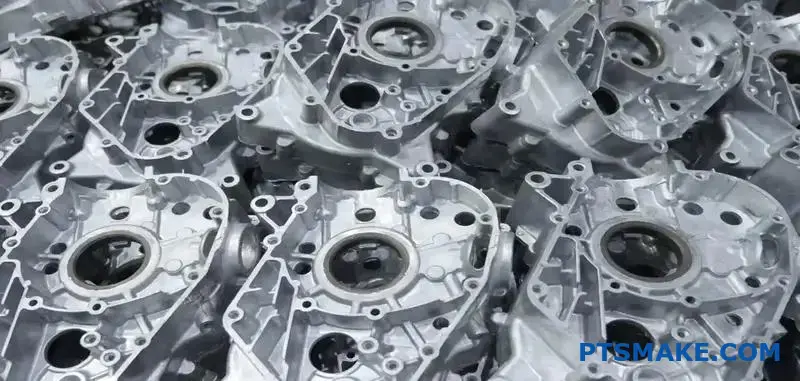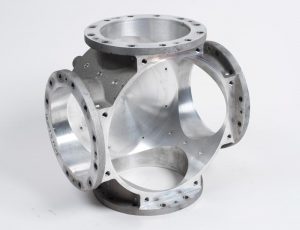How Precision aluminum casting Helps Create Lightweight Components for Every Industry
Discover the Benefits of Aluminum Casting in Modern Manufacturing
Aluminum casting has actually become a pivotal process in contemporary manufacturing. Its light-weight yet durable nature provides considerable benefits for numerous sectors. The capacity to achieve elaborate designs and keep tight resistances contributes to its allure. Aluminum Casting Company. In addition, the cost-effectiveness and environmental benefits make it a lasting choice. As producers seek ingenious options, the role of aluminum casting remains to develop. What certain applications and advantages await expedition in this dynamic area?
Lightweight Yet Solid: The Benefits of Aluminum
Many materials are made use of in manufacturing, aluminum stands out due to its impressive combination of light-weight properties and exceptional toughness. This distinct attribute makes aluminum an optimal selection for various applications, particularly in markets such as automotive, aerospace, and building and construction. Its reduced density enables less complicated handling and transportation, adding to minimized power consumption during production and setting up processes.
In addition, aluminum's strength-to-weight proportion is excellent, enabling producers to create resilient elements without including unnecessary bulk. This characteristic is specifically important in sectors where weight decrease can lead to boosted fuel efficiency and overall performance. Furthermore, aluminum's resistance to deterioration boosts the long life of items, additionally solidifying its appeal in modern manufacturing.
Ultimately, the light-weight yet strong nature of aluminum settings it as a recommended material, promoting technology and effectiveness throughout multiple fields. Suppliers increasingly recognize that these benefits can bring about significant developments in design and performance.
Precision and Complexity in Design
As makers accept the capabilities of aluminum casting, they uncover brand-new methods for precision and intricacy in style. This production process permits the production of elaborate forms and thorough functions that conventional techniques usually battle to achieve. The fluidness of molten aluminum allows it to fill complicated mold and mildews, causing elements with limited resistances and great surface area coatings.
This precision is particularly valuable in industries such as aerospace and vehicle, where precise specs are vital for performance and security. Aluminum casting additionally fits ingenious designs that boost performance without compromising structural stability.

Cost-Effectiveness and Performance
Cost-effectiveness and efficiency are extremely important factors to consider for makers discovering aluminum casting as a production method. Aluminum casting offers substantial expense advantages as a result of its lower product costs compared to other metals (Aluminum Casting Company). The lightweight nature of aluminum decreases shipping and handling costs, and its exceptional thermal conductivity permits quicker cooling times throughout the casting process, improving general manufacturing rate
Moreover, aluminum's versatility enables suppliers to develop intricate forms and styles, reducing the requirement for extra machining or setting up. This streamlining of production not just minimizes labor prices however additionally reduces lead times, allowing firms to react quickly to market needs.
Additionally, the toughness and deterioration resistance of aluminum spreadings add to longer item life expectancies, minimizing replacement expenses with time. Consequently, suppliers can achieve a balance of high-quality output and minimized functional expenses, making aluminum casting an increasingly attractive alternative in modern-day manufacturing.
Ecological Sustainability of Aluminum Casting
Aluminum casting stands out as an environmentally sustainable production alternative, specifically as a result of its recyclability and reduced eco-friendly impact. The process enables the efficient usage of aluminum, a product that can be reused indefinitely without losing its residential properties. This characteristic substantially reduces the need for virgin aluminum, therefore lessening and saving natural resources power consumption connected with extraction and processing.

Applications Throughout Industries: From Automotive to Aerospace
While diverse sectors proceed to seek ingenious products for manufacturing, aluminum casting has verified to be a flexible solution across industries such as vehicle and aerospace. In the automotive industry, aluminum spreadings contribute to light-weight automobile styles, boosting gas efficiency and performance. Components like engine blocks, transmission housings, and wheels take advantage of aluminum's strength-to-weight ratio.
Similarly, in aerospace, aluminum casting plays a significant role in generating complex parts that need high sturdiness and reduced weight. Airplane components such as brackets, touchdown equipment, and structural structures make use of aluminum for peak performance and safety.
Moreover, the versatility of aluminum casting permits it to satisfy various other sectors, consisting of consumer electronic devices, aquatic, and industrial equipment. This convenience not only satisfies the details requirements of different applications but also sustains recurring technology in manufacturing procedures. Consequently, aluminum casting remains a principal in modern production throughout many industries.
Often Asked Questions
Exactly How Does Aluminum Casting Compare to Other Metal Casting Processes?
Aluminum casting offers superior strength-to-weight ratios, faster air conditioning rates, and exceptional deterioration resistance contrasted to other steel casting processes. These advantages make it suitable for different applications, enhancing effectiveness and performance in manufacturing.
What Are the Normal Lead Times for Aluminum Casting Projects?
Typical find out this here preparation for aluminum casting projects vary from two to eight weeks, depending upon elements such as complexity, order size, and manufacturing capacity. Reliable preparation can aid decrease hold-ups and enhance task timelines.
Can Aluminum Casting Be Made Use Of for Intricate Layouts?
Aluminum casting can without a doubt suit elaborate layouts. Precision aluminum casting. Its fluidness enables comprehensive patterns and shapes, making it appropriate for intricate elements in different markets. This convenience enhances design flexibility while maintaining architectural stability and performance
What Post-Processing Options Are Readily Available After Aluminum Casting?
Post-processing options for aluminum casting include machining, polishing, surface area therapies, anodizing, and welding. These techniques enhance the coating, enhance dimensional precision, and boost rust resistance, thereby maximizing the final product's performance and aesthetic appeal.
Exactly How Do Temperature Level Modifications Influence Aluminum Casting Quality?
Temperature level adjustments significantly influence aluminum casting top quality by influencing fluidity, solidification prices, and potential issues. Quick cooling can lead to enhanced brittleness, while too much heat might create warping or incomplete dental filling of molds throughout casting.
Aluminum casting has emerged as a crucial procedure in modern manufacturing. As makers accept the abilities of aluminum casting, they discover brand-new opportunities for precision and complexity in layout. Aluminum casting processes typically produce fewer greenhouse gas exhausts contrasted to other metal casting methods. While diverse sectors proceed to look for cutting-edge materials for pop over here manufacturing, aluminum casting has confirmed to be a versatile service across sectors such as auto and aerospace. In the automobile market, aluminum spreadings contribute to light-weight car designs, improving fuel effectiveness and performance.